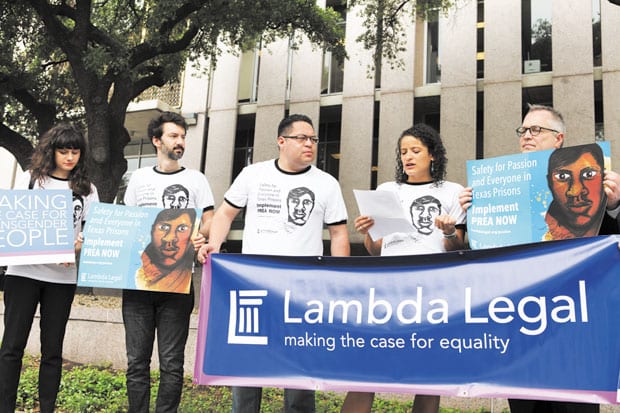
Lambda Legal and Equality Texas rally to support enforcement of the Prison Rape Elimination Act. (Photo courtesy Lambda Legal/Beatriz Medina)
JAMES RUSSELL | Staff Writer
The fight for equal rights didn’t end with the Supreme Court’s Obergefell v Hodges ruling. Want proof? Just look at the docket of Lambda Legal, which fights for equal rights for the LGBT community as well as those living with HIV and AIDS.
The agency still has more than 65 cases in its docket, ranging from HIV-criminalization laws to cases involving the Prison Rape Elimination Act.
The organization, founded in 1973, has argued in landmark cases such as Lawrence v. Texas, which overturned state sodomy bans. Recently the group, which has offices in New York, Atlanta, Dallas, Chicago and Los Angeles, argued in Passion Star v Livingston. In that case Star, a transgender woman currently held in a Texas prison, sued prison officials for neglecting threats of sexual assault and violence against Star, who was held in male facilities.
On March 4, Lambda Legal filed to move Star to a “safekeeping” facility, where prisoners who are subject to sexual or violent threats are housed. On March 30, Texas officials agreed to place Star in safekeeping.
“Passion’s life was in imminent danger and, 12 years after the passage of the Prison Rape Elimination Act, prison officials cannot pretend that they are unaware that LGBT individuals are vulnerable to sexual abuse when incarcerated,” Lambda Legal Staff Attorney Jael Humphrey noted.
The move was a small but pivotal victory, but the case continues.
That case brought larger questions about the Prison Rape Elimination Act, a federal bill passed unanimously a decade ago but has been mired in legal battles in Texas since former Gov. Rick Perry’s administration.
Other cases have since closed, thanks in part to the Obergefell ruling.
Leliaert v Ragland, was filed against the Employee Retirement System of Texas, which administers benefits for state employees. The suit was filed on behalf of Deborah Leliaert, an administrator at the University of North Texas in Denton, who was unable to enroll her wife, Paula Woolworth, for spousal benefits.
After Obergefell, ERS notified state employees with same-sex spouses that they would be able to enroll their spouses.
“We filed [this case] for two reasons: first, to highlight Deborah’s unequal treatment compared to her similarly situated colleagues with different-sex spouses in violation of the U.S. Constitution, and second, in anticipation that the Supreme Court might rule in favor of equality, to be sure that ERS complied,” said Lambda Legal Dallas-based Senior Counsel Ken Upton.
In March, the organization settled with a Georgia-based company after an employee was fired for disclosing his HIV status. Their client, Chanse Cox, was machine operator at Gregory Packaging who was fired after disclosing he had HIV. The company agreed it wrongfully terminated him because it misinterpreted a federal regulation addressing food manufacturing and communicable diseases, believing HIV fell under those standards. They believed termination was required, though HIV is not a foodborne disease.
It’s crucial to both update the Americans with Disabilities Act and educate the public that HIV should neither be feared nor is it a crime, said Scott Schoettes, Lambda Legal’s HIV Project Director. Advocates have to challenge “outdated policies and misconceptions about HIV,” he said.
Much of Lambda’s work would also refocus should the recently introduced Equality Act pass in Congress. Indeed, it would address some Lambda Legal’s most commonly addressed issues.
The sweeping bill would prohibit discrimination in employment, housing, credit, education and jury service based on sexual orientation and gender identity. It also prohibits discrimination against those receiving federal funding and in public accommodations based on sexual orientation, gender identity, and sex.
“The Equality Act is essential because, while the legal landscape is evolving rapidly, LGBT Americans continue to face appalling, unjust discrimination in many aspects of their everyday lives. We know this from the thousands of calls Lambda Legal’s Help Desk gets each year from all corners of our country,” according to Jennifer Pizer, Senior counsel and Director of Lambda Legal’s Law and Policy Project.
She said their legal desk has “received nearly 850 such calls in the past year alone.”
The organization, however, will still have other cases ahead of them regardless of the Equality Act’s passage.
While individual cases may be resolved, there is a two-step solution for achieving full equality. It involves litigation, but, as Schoettes said, it also involves education.
……………………..
A selection of current Lambda Legal cases
Passion Star v Livingston: Passion Star is a transgender woman currently housed in a Texas prison but faced negligence at the hands of and harassment by prison officials in the prison’s male facilities. Star was finally moved to a ‘safekeeping’ facility for prisoners subject to violent threats.
Odgaard v Iowa Civil Rights Commission: Betty and Richard Odgaard refused to rent their event space to Lee Stafford and Jared Ellars, a gay couple seeking to host their wedding, citing religious objections. The couple subsequently filed a complaint with the Iowa Civil Rights Commission, but the Odgaards filed suit against the ICRC blocking the agency’s investigation of the matter.
Recent victories
Leliaert v Ragland: The Employee Retirement System of Texas barred Deborah Leliaert from enrolling her wife Paula Woolworth, for spousal benefits. After Obergefell, ERS notified state employees with same-sex spouses that they
would be able to enroll their spouses.
EEOC v Gregory Packaging:
Chanse Cox was fired from his job at Gregory Packaging after disclosing his HIV status. Lambda Legal and Gregory ultimately settled and the company took fault for the wrongful termination. Cox was awarded $125,000
This article appeared in the Dallas Voice print edition August 14, 2015.

